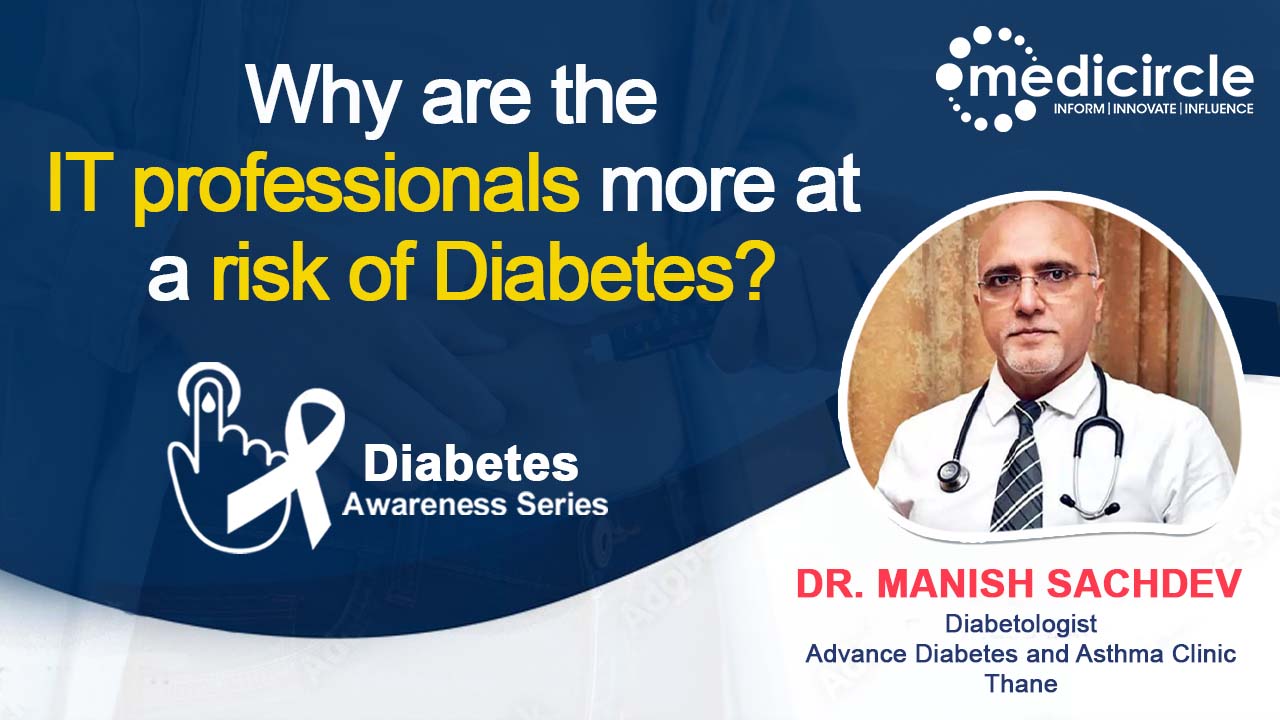Dr. Manish Sachdev is a renowned Diabetologist in Thane and currently practicing in the Advance Diabetes and Asthma Clinic, Thane. For the past 31 years, he has worked as a Diabetologist. He is a well-known member of the Public Health Foundation of India (PHFI), the Maharashtra Medical Council, the European Association for the Study of Diabetes (EASD), and the American Diabetes Association (ADA).
Diabetes signs and symptoms
Dr. Manish says, “Diabetes mellitus is the silent killer. The most prominent symptom is having no symptoms. 80% of diabetic patients remain with no signs and symptoms for years. Regular screening for diabetes is the best way to detect it early. Doctors should screen their patients above 30-40 years for diabetes every 3-6 months. This will help in the early detection of people in the pre-diabetes stage.
Type I and Type II diabetes
Dr. Manish explains, “In Type I diabetes, the pancreas doesn’t make any insulin. In Type II, your pancreas doesn’t make enough insulin, and the insulin it is making doesn’t always work as it should. Type I diabetes can be sudden. In this, the body’s blood sugar level rises sharply which reduces upon insulin administration.
While in type II, lifestyle modification, meditation, and exercise help keep diabetes in control initially but as age advances, the pancreas ability to make insulin decreases, and it gets difficult to manage or control diabetes.”
Insulin is essential for patients having type I diabetes. Missing one or two doses of insulin can result in hospital admission with the presentation of diabetes ketoacidosis.
Whatever we eat, gets converted into sugar. Our brain needs glucose to function properly. The major purpose of insulin is to regulate the body’s energy supply by balancing micronutrient levels during the fed state. Insulin is critical for transporting intracellular glucose to insulin-dependent cells/tissues, such as the liver, muscle, and adipose tissue.
High glycemic foods
Food that increases sugar levels in our body is termed high glycemic foods. They include
- Bread
- Sugary fruits
- Sweets
- Honey
- Jaggery
Low glycemic foods
- Green leafy vegetables
- Citrus fruits
- Dry fruits
- Boiled eggs
- Fish
- Jawar, nachini, bajra
There should be adequate proteins in our daily diet. As per a survey, half of the Indians are taking inadequate protein intake. One must include these listed in the daily diet.
- Dal and sprouts
- Paneer. Tofu. soya
- Boiled eggs
- Fish
- Green leafy vegetables for fiber
Even jaggery is also harmful to diabetes patients. They should refrain from taking this even for tea owing to its high glycemic index.
Diabetes patients should never skip breakfast. They should follow the routine of early dinner and never skip breakfast. Breakfast is not compulsory to be taken early. You just need to maintain prolonged fasting for better fat burn. Diabetes patients should consult their doctors/ medical practitioner before following any diet routine or system.
Diabetes Complications
Potential complications of high blood sugar are
- Acute complications – Hypoglycemia, Hyperglycaemia, and infections
- Chronic complications – This can be divided into
- Microvascular complications - Nephropathy, Retinopathy, Neuropathy
- Macrovascular complications – Ischemic heart disease, Peripheral vascular disease, and Cerebrovascular disease
Chronic complications show negative effects in the long run.
Dr. Manish emphasizes, “Cases of diabetes are increasing among IT people. High incidences of diabetes in IT people are due to a sedentary lifestyle and high-stress levels. There is a need to raise awareness and incorporate meditation into daily routines. They need to relax their mind and attain mental peace through yoga or relaxation techniques."
FAQs
1. Can diabetic patients consume sugar?
Ideally No. We are highly exposed to some or other kind of sugar throughout our day. Hence, we should practice the culture of picking a small piece of sweet and eating it slowly. Sugar-free sweets are high in ghee or butter, so consume them wisely.
2. Is Epsom salt good for a diabetic foot massage?
Epsom salt is hygroscopic in nature and absorbs water in it. Refrain from using it for massage as Epsom salt is of no medical significance for diabetic patients.
(Edited by Renu Gupta)

 Diabetes mellitus is a silent killer. If left untreated, Type II diabetes can cause such health problems as heart disease, kidney disease, and stroke. You can manage this disease by making lifestyle modifications, taking medications and/or insulin, and seeing your doctor for regular checkups.
Diabetes mellitus is a silent killer. If left untreated, Type II diabetes can cause such health problems as heart disease, kidney disease, and stroke. You can manage this disease by making lifestyle modifications, taking medications and/or insulin, and seeing your doctor for regular checkups.









.jpeg)

















.jpg)


